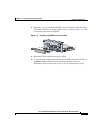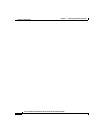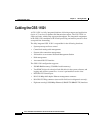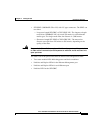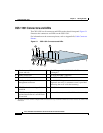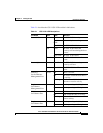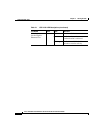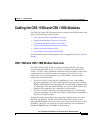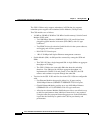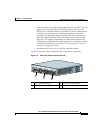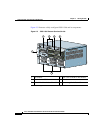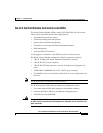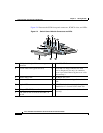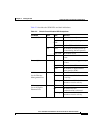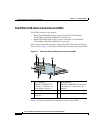
2-7
Cisco 11500 Series Content Services Switch Hardware Installation Guide
78-13884-03
Chapter 2 Cabling the CSS
Cabling the CSS 11503 and CSS 11506 Modules
Cabling the CSS 11503 and CSS 11506 Modules
The CSS 11503 and CSS 11506 modules have connectors and LEDs on their front
panels. The following sections describe:
• CSS 11503 and CSS 11506 Module Overview
• Switch Control Module Connectors and LEDs
• Fast Ethernet Module Connectors and LEDs
• Gigabit Ethernet Module Connectors and LEDs
• Session Accelerator Module LEDs
• Secure Socket Layer (SSL) Module LEDs
For information on the connector pinouts, refer to Appendix B, Cable Connector
Pinouts.
CSS 11503 and CSS 11506 Module Overview
The CSS 11503 and CSS 11506 are compact modular platforms, delivering
transport and application (layers 4-7) services for Internet and Intranet data
centers. A CSS is a fully-distributed architecture with all modules in the system
contributing to the overall processing and memory needs for flow set up.
Performance increases incrementally as you add modules, and the modules
balance the overall traffic load.
• The Cisco 11506 is a five-rack unit, supporting six-slots, with 40-Gbps
aggregate throughput. The CSS 11506 requires at least one Switch Control
Module (SCM) and may be configured with a second SCM in standby mode
for redundancy. With the required SCM in one slot, the CSS 11506 has five
additional slots supporting any combination of I/O modules.
• The Cisco 11503 is a two-rack-unit, supporting three-slots, with 20-Gbps
aggregate throughput. The CSS 11503 requires an SCM and accommodates
any two of the other modules.
Though all modules participate in flow setup, they differ primarily in control
functions, performance, and I/O. Each CSS 11500 module consists of one
high-speed MIPS RISC processor for flow-setup, one network processor for flow
forwarding, one policy co-processor for search operations and a maximum of
288 MB of RDRAM (up to 256 MB of usable memory).



